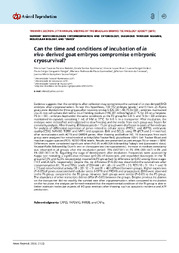Can the time and conditions of incubation of in vivo-derived goat embryos compromise embryonic cryosurvival?.
Can the time and conditions of incubation of in vivo-derived goat embryos compromise embryonic cryosurvival?.
Author(s): BATISTA, R. I. T. P.; APOLINARIO, G. S.; BRAIR, V. L.; CÔRTES, L. R.; RANGEL, P. S. C.; GUIMARÃES, M. P. de P.; FONSECA, J. F. da; SOUZA-FABJAN, J. M. G.
Summary: Evidence suggests that the conditions after collection may compromise the survival of in vivo-derived (IVD) embryos after cryopreservation. To test this hypothesis, 150 IVD embryos (grade I and II) from 25 Alpine goats were divided into three groups after recovery on day 6 (D6; D0 = AI): P3 (n=50) – embryos maintained in a 35 mm cell culture dish with 2 mL of holding medium (HM; 301 mOsm/kg) at 37 °C for 3 h on a hotplate; P6 (n = 50) – embryos kept under the same conditions as the P3 group for 6-8 h; and T6 (n = 50) embryos maintained in cryovials containing 1 mL of HM at 37°C, for 6-8 h, in a transporter. Despite previous incubation on the transporter did not modify the survival rate after cryopreservation, when compared to incubation on the hot plate, the analysis performed revealed that the experimental condition of the T6 group is able to better maintain molecular aspects of IVD goat embryos after thawing, such as apoptotic incidence and ATP production.
Publication year: 2024
Types of publication: Abstract in annals or event proceedings
Unit: Embrapa Goats & Sheep
Observation
Some of Embrapa's publications are published as ePub files. To read them, use or download one of the following free software options to your computer or mobile device. Android: Google Play Books; IOS: iBooks; Windows and Linux: Calibre.
Access other publications
Access the Agricultural Research Database (BDPA) to consult Embrapa's full library collection and records.
Visit Embrapa Bookstore to purchase books and other publications sold by Embrapa.

